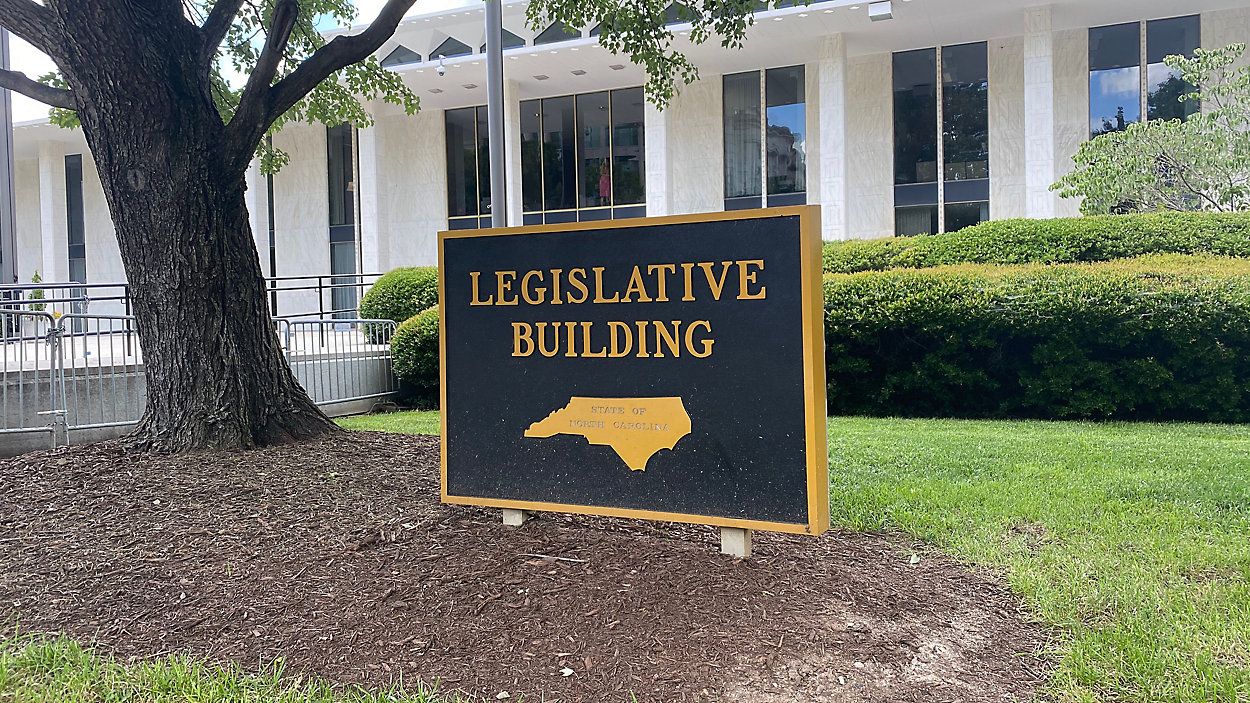The North Carolina General Assembly is scheduled to begin its new session at noon Wednesday. Many of the same issues from last year will be back up for debate, including expanding Medicaid, legalizing medical marijuana and sports gambling.
New abortion restrictions will likely be on the table after last year’s Supreme Court ruling that overturned Roe v. Wade. And redistricting will be back this year after a monthslong political and legal fight last year that ended with a court approving its own map for North Carolina’s 14 congressional districts.
Republicans will gavel in the long session with a supermajority in the Senate and just one seat shy of a supermajority in the House. The bigger majorities will give Republicans in the legislature more leverage over Democratic Gov. Roy Cooper, and more openings to override any possible vetoes.
“First and foremost is the state budget. That’s the most important thing that we do,” said Rep. Jon Hardister, a Guilford County Republican. “We’ll be looking to provide teachers and state employees with an additional pay increase if possible - education funding, continuing our efforts to grow the economy.”
Raising salaries for state employees, including teachers, is top on the agenda for Democrats, too.
“We need to commit to solid raises across the board to keep state jobs competitive,” Wake County Democrat Sen. Dan Blue said. He said salaries for people on the state payroll have not kept up with inflation and the private sector.
“The state is in a position to deal with it right now,” Blue said, with more than $4 billion in surplus held over from last year and more than another $1 billion projected this year.
One of the biggest fights in the coming session could be over new abortion restrictions in North Carolina. The United States Supreme Court last year overturned Roe v. Wade, giving full control over abortion to the states.
Since the ruling last summer, many Republican-controlled states have moved to severely restrict abortion access. States controlled by Democrats have passed laws to protect abortion access.
Abortion in North Carolina is legal up to 20 weeks of pregnancy. But some Republican lawmakers in the state have suggested a so-called “heartbeat bill” or a 12-week ban.
Gov. Roy Cooper has vowed to veto any new abortion restrictions. But with their big majority in the General Assembly, Republicans could potentially override the veto if some Democrats sit out the vote.
“What these do is arbitrarily choose a number and act as if that number is going to answer these complicated questions about a woman’s health,” Blue said.
The position of the Senate Democrats is they want to codify Roe v. Wade into North Carolina law, Blue said. That seems unlikely given the Republican majority’s opposition to abortion access.
Expanding Medicaid, which was once a nonstarter for North Carolina Republicans, came as close as it ever had in 2022. Republican leaders in the General Assembly supported the expansion. Medicaid expansion would add thousands of people in North Carolina to the federal health insurance program.
Two separate Medicaid expansion bills passed the House and Senate, but legislative leaders could not come to an agreement on a final bill.
“There’s going to be additional discussions on Medicaid expansion,” said Hardister, the Republican representative. "If there is a proposal to expand Medicaid, what else does it contain?”
Hardister said Medicaid expansion would likely include changes to the state’s Certificate of Need law, which regulates how hospitals can expand. It could also include reforms for mental health and allowing nurses with advanced training to offer more services, which could improve health care access in rural communities.
“I’m encouraged by the progress we’ve made on Medicaid expansion,” said Blue. “We really need to make Medicaid expansion the life-or-death issue for North Carolinians that it is.”
Medicaid expansion last year had bipartisan support, but the shorter session left legislators without enough time to hammer out the details. Those debates will likely be back on the table this session.
A proposal to legalize medical marijuana, championed by Republican Sen. Bill Rabon, had bipartisan support last year. The bill would have tightly regulated medical marijuana dispensaries, allowing doctors to prescribe pot to people with debilitating conditions, like cancer and severe PTSD.
Dubbed the N.C. Compassionate Care Act, the bill passed the Senate after a year of hearings, debates and amendments.
Hardister said he expects the medical marijuana bill to be filed in the North Carolina Senate again will look much like the bill they negotiated last year.
A bill to legalize gambling on sports in North Carolina also passed the Senate last year but did not make it through the House. The bill would have created a tightly controlled framework to legalize and tax betting on sports in North Carolina.
Hardister said he expects to see a similar bill filed this session and he plans to help work on the House version.
Republicans this year will be back at the drawing table once again to draw new electoral lines, at least for congressional districts. Last year the redistricting process turned into a monthslong political and legal fight that went to the North Carolina Supreme Court and, eventually, to the United States Supreme Court.
The state courts threw out the maps initially drawn by legislators, calling them unconstitutional gerrymanders that gave too much political power to Republicans. Legislators redrew the maps and a three-judge panel accepted both state legislature maps, but ordered a congressional map to be drawn again by a special master appointed by the court.
In the last election, Republicans and Democrats evenly split North Carolina’s 14 seats in Congress, which is what could be expected from a state that is evenly divided politically.
That court-ordered congressional map, and what led to the new map, is what is currently before the U.S. Supreme Court. Republican leaders in the General Assembly argue that they are the sole authority over federal elections in North Carolina, using a once obscure legal theory called the “independent state legislature theory.”
A ruling in that case is expected in the summer. But in the meantime, Republicans have a new majority on the North Carolina Supreme Court that could allow the legislature to pass new maps that favors the GOP.








